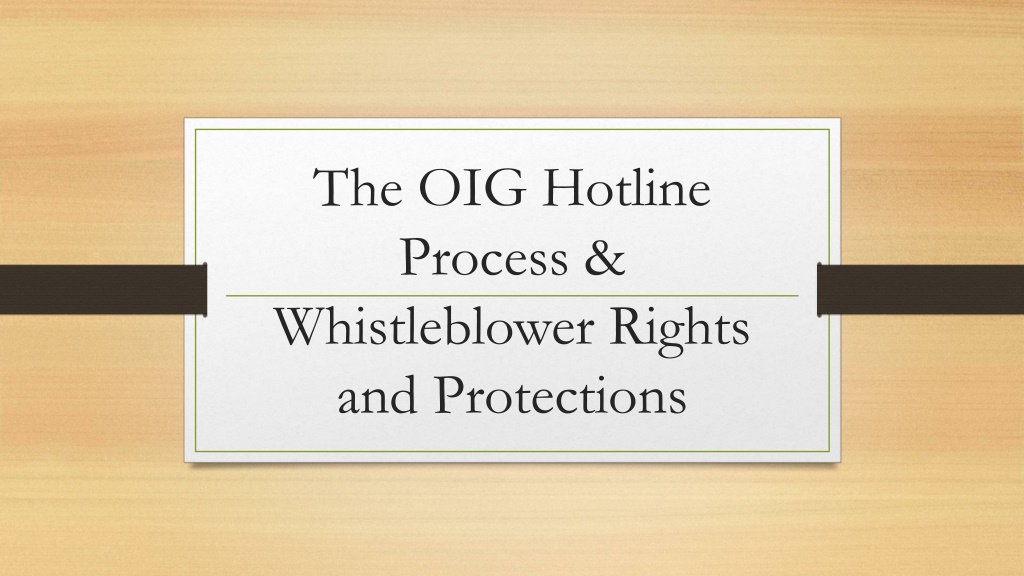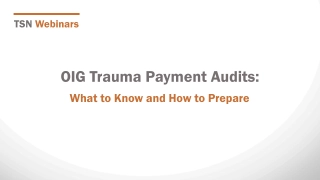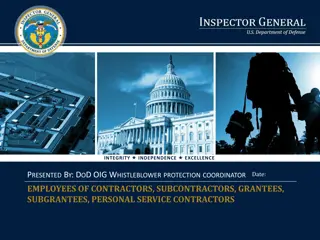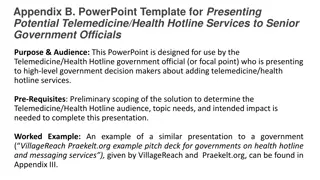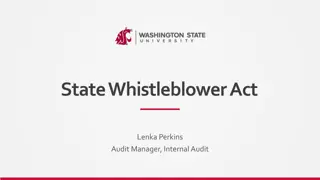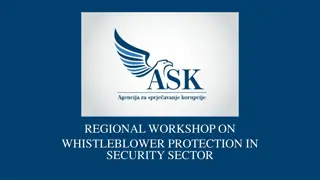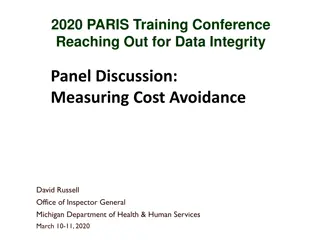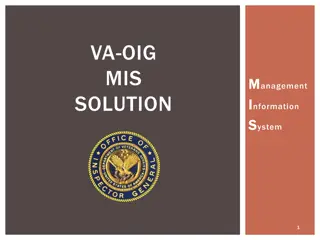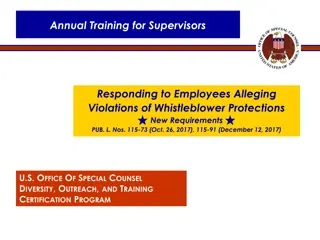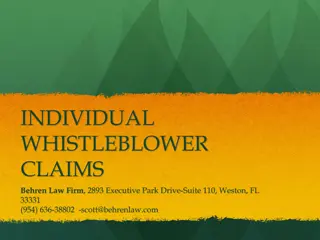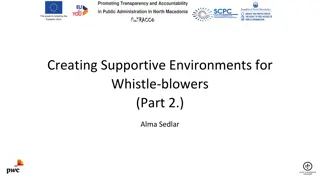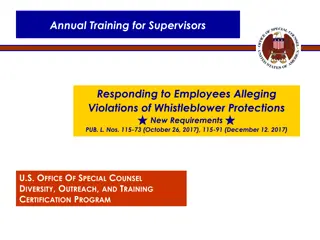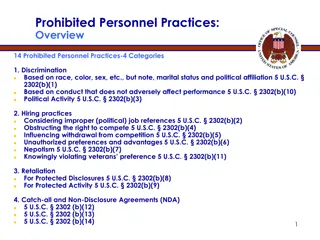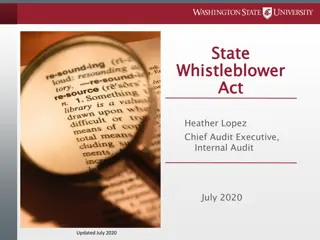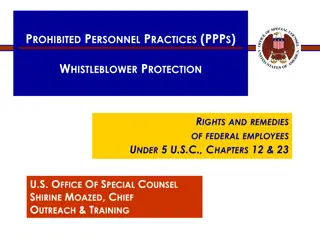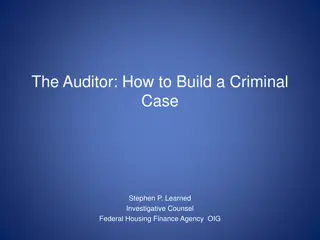Understanding the OIG Hotline Process & Whistleblower Rights
Learn about the OIG Hotline Process, Whistleblower Protections, Definitions, Whistleblower Disclosures, Statutes, and the Inspector General Act. Discover how to file a complaint, know your rights, and the process of handling complaints. Understand the importance of protecting whistleblowers and the mechanisms in place for reporting violations.
Download Presentation

Please find below an Image/Link to download the presentation.
The content on the website is provided AS IS for your information and personal use only. It may not be sold, licensed, or shared on other websites without obtaining consent from the author. Download presentation by click this link. If you encounter any issues during the download, it is possible that the publisher has removed the file from their server.
E N D
Presentation Transcript
The OIG Hotline Process & Whistleblower Rights and Protections
Definitions Complaint: The official record of an alleged violation of a law, rule, or regulation. Complainant: The person disclosing a violation of laws, rules and regulations. Disclosure: A complaint to report violations of laws, rule, and regulations (Whistleblower). Protected Activities: Appeals/grievances/EEO complaints; testify or assisting an employee exercising their rights; cooperating with or disclosing information to OIG or OSC; or refusing to obey an unlawful order. Prohibited Personnel Practices (PPP): Employment related activities banned in the Federal workforce. Subject: The agency or employee who allegedly violated a law, rule, or regulation. Whistleblower Protection Coordinator (WPC): Educates agency employees about prohibitions on retaliation for protected disclosures and educate those who have made or contemplating making a protected disclosure about the rights and remedies against retaliation. Resides in the Office of Inspector General.
Whistleblower Disclosures Filing a Complaint
Whistleblower Statutes 5 USC 2302(b)(8) &(9) 41 USC 4712 Kirkpatrick Act of 2017 IG Act PPD-19
Inspector General (IG) Act The IG Act of 1978 established Offices of Inspectors General (OIGs). OIGs are to: Be independent and objective. Establish a hotline that accepts complaints from Department employees disclosing violations of laws, rules, or regulations pertaining to fraud, gross waste of funds, abuse of authority, gross mismanagement, or substantial and specific danger to public health or safety within their Department. Maintain confidentiality of complainants unless given consent. Must accept complaints online and allow for anonymity. Investigate retaliation against complainants USDA s OIG is responsible for investigating or auditing allegations.
Hotline Process Hotline receives complaint Triage is conducted and complaint is referred to the appropriate office OIG s Audit or Investigations office has the right to decline an inquiry into a hotline complaint. Complaints not handled by OIG are sent to the USDA agency s Liaison Officer who then opens an inquiry. However, if the subject of the complaint is an SES or a political appointee the complaint is sent to the Departmental Management Liaison Officer.
Do I Have to Disclose My Name? 3 options for complainants to hold their identity Confidential name and contact information is known only within OIG Allow name to be used complainant consents to their identity and contact information to be provided within the hotline complaint content Anonymous name and email address is not known within or outside OIG
Making a Complaint at USDA All complaints are now made on-line. There are two ways to access the on-line complaint portal: Going through the USDA website: https://www.usda.gov Accessing the Hotline website: https://www.usda.gov https://usdaoig.oversight.gov/resources/hotline-information https://usdaoig.oversight.gov/resources/hotline- information https://usdaoig.oversight.gov/resources/hotline-information
Accessing USDA OIG Hotline To access the USDA OIG Hotline, first go to USDA s homepage and navigate to the Office of Inspector General s (OIG) homepage. To navigate to the OIG homepage from USDA s homepage: Navigate to the header, Our Agency and select from the dropdown menu, Staff Offices. Scroll down the page to the Title, Office of Inspector General. or Scroll to the bottom of the homepage and select the title link, Visit OIG. Either link takes you to the U.S. Department of Agriculture Office of Inspector General home page. Once on the OIG homepage, navigate to the title heading, Hotline and select Hotline Information in the dropdown menu.
OIG Hotline Information Page The OIG Hotline Information Page offers two ways to navigate to the complaint portal. At the top right corner of the page, click on the button stating REPORT FRAUD, WASTE, AND ABUSE or Scroll down until you locate the box titled Hotline Online and click on the button Submit a complaint
Prohibited Personnel Practices (PPPs) PPPs Defined and Filing Complaints
U. S. Office of Special Counsel (OSC) and PPPs PPPs are employment-related activities that are banned in the federal workforce because they violate the merit system through some form of employment discrimination, retaliation, improper hiring practices, or failure to adhere to laws, rules or regulations that directly concern the merit system principles. OSC s primary mission is to protect federal employees and applicants from PPPs, especially reprisals. OSC investigates and prosecutes federal employees found in violation of employment related activities banned in the Federal workforce including those who retaliated due to the disclosure.
14 Prohibited Personnel Practices (PPPs) PPPs fall under 4 categories: Discrimination, Hiring Practices, Retaliation, and Catch-All Hiring Practices Discrimination Discrimination: race, color, religion, sex, national origin, age, disability, marital status, political affiliation, sexual orientation, gender identity. Coercing Political Activity: denying privileges of an employee for refusal to participate in political activity of a superior. Other Discrimination: penalizing an employee for conduct that has no adverse impact on job performance or o the ability of others to perform their job. Considering Inappropriate Recommendations: recommending a person for employment only on the basis of a political affiliation. Obstructing Competition: intentionally deceiving or obstructing one from competing for a position. Influencing Withdrawal from Competition: encouraging an employee to withdraw their name from a position because the superior desires their candidate to get the position. Granting Unauthorized Advantage: manipulating the hiring process with the intent of improving or injuring a person s chance of selection. Nepotism: federal employees cannot hire or promote their relative, complete an annual performance evaluation, and advocating for easier duties. A relative cannot be in a superior or subordinate position of a relative. (includes, in-laws, step-relatives, and half- relatives). Veterans Preference: failing to place an eligible veteran in the top of a list of eligible candidates for the purpose of not allowing proper competition.
14 Prohibited Personnel Practices (PPPs) Retaliation Whistleblower Retaliation: take, recommend, approve, or direct others to take a personnel action against a complainant. Other Retaliation: taking, failing to take, or threatening to take a personnel action because an employee engaged in any of the four protected activities. Catch-All Violating Rules that Implement a Merit System Principle Imposing Nondisclosure Agreement: Agencies may not impose nondisclosure agreements, to those subject to a nondisclosure agreement, that omits employee s whistleblowing rights, including obligations pertaining to classified information. Accessing Medical Records in Furtherance of Another PPP: using one's medical information against them.
Protection from Retaliation Whistleblower Disclosure Other Protected Activities Contractor Protections Presidential Policy Directive-19 (PPD-19)
2017- Dr. Chris Kirkpatrick Whistleblower Protection Act & OSC Reauthorization Act Authorizes agency head to take disciplinary action against supervisors for: 1. retaliation against whistleblowers; 2. retaliation for exercising their right to grieve and cooperate with OIG; or 3. wrongful access of medical records.* For the first offense, the supervisor shall propose suspending the supervisor for not less than 3 days and for the second offense shall propose removal of the supervisor Requires supervisors to have a critical performance element to promote the protection of whistleblowers. Criteria is to be developed by OPM and OSC. *determination can be made by MSPB, OSC, or OIG
The OIGs Role in Retaliation Cannot Can Provide information and resources Offer specific guidance Intervene or directly assist Receive a complaint Educate complainant on their rights *Investigate certain acts of retaliation Prevent retaliation Guarantee a remedy 17
Retaliation 5 U.S.C. 2302 (b)(8) & (b)(9) Who Can Retaliate Against Me? Federal law states retaliation can only be from an employee who has authority to take, direct others to take, recommend, or approve any personnel action against a complainant is considered. First Line Supervisor, Manager, Senior Executive Service (SES), or any other employee within the complainant's chain of command. Any person who influences an employee as defined above, to retaliate against the complainant. Types of personnel actions are: discipline; poor performance evaluation with no cause; promotion; appointments; transfer; change of duties; demotion; or non- consideration for training (not inclusive).
The 3 Elements Proving Whistleblower Retaliation Element 2: The personnel action in question must have been taken/withheld, threatened or influenced by an official who knew of the employee's disclosure. Element 1: Employee must have disclosed a violation or participated in protected activity Element 3: The employee s disclosure was a contributing factor in the personnel action .
Burden of Proof When making a complaint with OSC, it is important to ensure one submits as much evidence as possible to support the complaint. Once OSC opens a full investigation, the burden shifts to the Agency to prove no retaliation occurred. Complainant Agency
Whistleblower Protection Things to Know and Understand Whistleblower Protection covers protected disclosures. While retaliation is prohibited, it can happen. However, if it does happen, the Whistleblower Protection laws provide avenues to seek redress and remedies. If you make a complaint anonymously you are not protected because there is no complaint linked to you. If management thinks you made a complaint and they retaliate against you, you may be entitled to protection.
Am I Protected from Whistleblower Retaliation? Current and past employees who file a complaint and opted for confidential or allowed their name to be used as the complainant are protected from whistleblower retaliation. Applicants, internal or external, who file a complaint and opted for confidential or allowed their name to be used as the complainant are protected from whistleblower retaliation. *In certain instances, employees of contractors, sub-contractors, grantees, sub- grantees, as well as personal services contractors are entitled to protection from whistleblower retaliation. Anonymous complainants are not entitled to protection from whistleblower retaliation.
Protected Activities Federal employees shall not be retaliated due to participating in one of the following protected activities: Refusing to obey an order that would require one to violate a law, rule, or regulation Exercising any appeal, complaint, or grievance right whistleblower or otherwise Testifying for or otherwise assisting someone exercising such rights Cooperating with or disclosing information to OIG or OSC
Contractor* Protections 41 U.S.C 4712 (Pub. L 112-239 828) gave OIGs full jurisdiction to investigate retaliation against a contractor. The Department s Secretary (e.g., Secretary of Agriculture) has the authority to impose redress against the contractor s employer and/or the Federal employee requesting retaliation.
Contractor* Disclosure Parameters Retaliation Must have reasonable belief of: Disclosure must be made to: Congress OIG GAO Agency contract/grant oversight official DOJ/law enforcement Court or grand jury Manager or other employee of the contractor who can investigate misconduct Gross mismanagement of a contract or grant Gross waste of Federal funds Abuse of authority relating to a contract or grant Substantial and specific danger to public health or safety Violation of law, rule, or regulation related to contract or grant
41 U.S.C. 4712 Process and Remedies OIGs must investigate all whistleblower retaliation claims made by a contractor et al.* The OIG Report of Investigation is sent to the Secretary of Agriculture. The Secretary has 30 days to decide if there is sufficient cause to determine if the contractor s employee* was retaliated against. Note: OSC does not have jurisdiction over contractors* as they are not Federal employees.
Timeline The retaliation complaint must be submitted to OIG within 3 years of reprisal OIG submits report to complainant, contractor, and agency head Department Secretary of Agriculture head has 30 days to take action OIG has 180 days to dismiss or investigate
Remedy and Enforcement Authority The Secretary Determines: No Retaliation or No Action Deny relief Takes no action within the 30-day window Retaliation Occurred Order to abate retaliation Order to reinstate contractor Order to pay contractor damages Contractor has a right to sue in district court if either above apply 31
Presidential Policy Directive-19 (PPD-19)
Presidential Policy Directive 19-Retaliation Effective July 8, 2013 Prohibits any officer or employee of an executive branch agency who has authority to take, direct others totake, recommend, or approve any action affecting an employee s eligibility for access to classified information as a form of retaliation. Retaliation complaints must be investigated by OIG, with report to Agency Head recommending corrective or disciplinary action. OSC does not have jurisdiction. The employee may appeal the Agency Head decision to an external review committee. To report a classified compliant, call either secured line: 202.720.9731 or 816.926.7936.
Conclusion To make a compliant visit: https://www.usda.gov/oig/hotline For specific questions concerning Whistleblower Protection or Retaliation, contact the Department s WPC at https://www.usda.gov/oig/wpc To report Whistleblower Retaliation, complete the online form at https:/www./osc.gov
